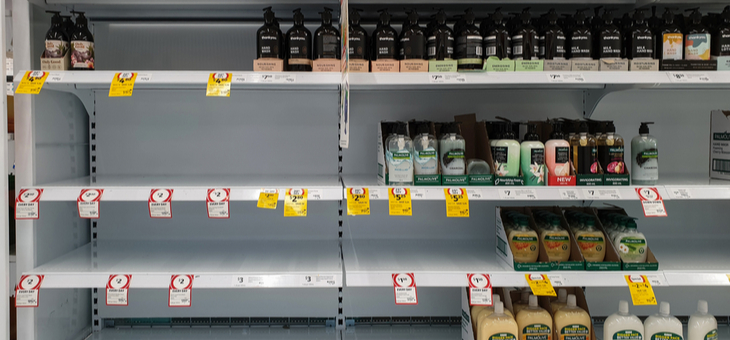Supermarkets will cut promotions and fewer products will be seen on shelves as tighter restrictions force more manufacturers to close and a lockdown on more services looms.
According to a New Daily report, Woolworths is already limiting regular weekly specials and is struggling to keep up with demand caused by the coronavirus outbreak.
Coles has also announced it will not publish a printed catalogue, as it is reticent to disappoint those who might be hunting for an advertised promotion the store can’t facilitate.
While hot-ticket items such as toilet paper return to shelves, customers will already be seeing other favourite items and essentials disappearing.
The meat department is a prime example of an area thinning in options. While meat products prepared in-store should be plentiful, expect to see a dearth of pre-prepared meat and poultry.
“There’s plenty of cows, there’s plenty of chooks but not plenty of people who are skilled to break down an animal (to meet the consumer demand), and that’s why we’re seeing less of these products on the shelves,” Queensland University of Technology associate professor Gary Mortimer told The New Daily.
Cheese and chocolate supplies will also start to dwindle, as will any products made offshore, as supply chains will soon start to feel the effects of border shutdowns. Many fear that fresh produce prices will rise and non-perishables such as packaged chips and biscuits will thin out as any factories deemed non-essential are closed.
“We could soon see some items disappear because producers and distributors are closing doors,” said marketing researcher Dr Michael Callaghan.
Once non-perishables start to peter out, some people are expecting price gouging on fresh fruit and vegetables. But Dr Callaghan said this accusation would be a hard link to prove, as winter already puts a premium on such produce.
However, he said any hindrances to the supply and distribution chain would naturally lead to higher prices.
“If a farmer is also trying to keep their head above water, and prep for an uncertain future, they could very well be selling their products at a higher price,” said Dr Callaghan.
“That inflation is passed onto customers. It’s just business.”
“The longer this goes on, the less super supermarkets will be,” he said.
While it may seem that Woolworths has indeed been ‘super’ by leading the charge on supporting Australians through this crisis, Dr Callaghan says the supermarket chain may have ulterior motives for its perceived benevolence.
“Woolworths does have a fairly strong reason for maximising profits and minimising costs because they’ve got to pay back all the wage theft they took from employees,” said Dr Callaghan.
“That’s part of the reason consumers might have noticed Woolies leading the way in ‘corona-washing’: Announcing business decisions that paint the company as a hero, such as dedicated community shopping hours.”
“Coles hasn’t really come out and corona-washed their business at all,” he added.
“And for me, that’s the wisest thing to do.”
Are you shopping with Woolworths or Coles? Which products have you noticed are in limited supply?
If you enjoy our content, don’t keep it to yourself. Share our free eNews with your friends and encourage them to sign up.
Related articles:
Supermarket support for over-70s
Support services for shut-in seniors
Woolworths to cut opening hours

